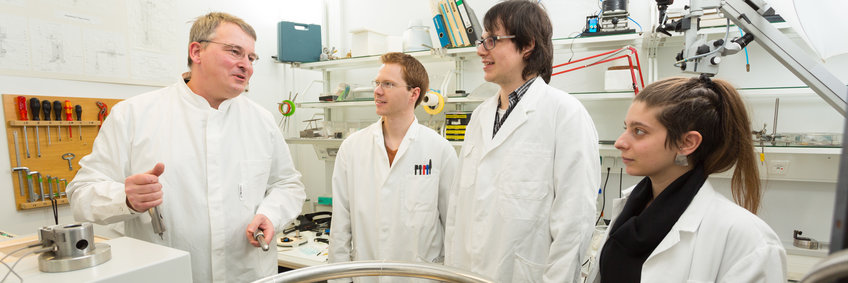
Facilities
Our PhD students are encouraged to formulate innovative and exciting research projects and to consider multiple approaches to their research question. To enable this, they have access to the specialized technological platforms, state-of-the-art facilities and specific methodological expertise supplied across the participating institutes. Of course, each individual group within the PhD programs is very well equipped and provides an excellent home base for PhD research.
Specialized facilities include:
- Genome Center (MPI): This facility is equipped with two Illumina instruments for next generation sequencing and a Pacbio long-read sequencer, along with various devices for sequencing library generation; it also hosts an ABI capillary sequencer.
- Proteome Center (PCT, at IFIZ): The Proteome Center is equipped with three high accuracy Orbitrap mass spectrometers and provides comprehensive proteomic support to research groups both at the University and at the MPI.
- NMR spectroscopy facility (MPI): This platform is equipped with a 600 and a 800MHz spectrometers (MPI) and provides extensive training and experimental support to IMPRS students.
- X-ray crystallography (MPI, IFIB): Both the MPI and the University of Tübingen have made significant investments for enhanced competence in X-ray crystallography and share the infrastructure (crystallization robot, MPI; X-ray generator, IFIB).
- High-performance computing facilities (ZBIT, MPI): large computer clusters with a total of 2000 CPU cores and hundreds of TB of storage.
- Light microscopy core facilities are located at the ZMBP and MPI/FML. They offer access to a variety of advanced light microscopy techniques such as confocal microscopy, 2-photon microscopy or fluorescence lifetime imaging. They also offer instrument training and support scientists in experiment design, image processing and other imaging related issues. The imaging platform at the IMIT specifically allows fluorescence live-cell studies (super-resolution Airyscan detector, focus stabilization and incubation chambers for long-term time-lapse studies) and atomic force microscopy of pathogenic bacteria under biosafety level II conditions.
- Advanced microscopy techniques including atomic force microscopy (IFIB, IMIT), fluorescence correlation spectroscopy and single particle tracking (IFIB); single molecule fluorescence imaging and use of high-resolution optical tweezers (ZMBP).
- Electron microscopy (MPI): The lab is equipped with a transmission electron microscope and a scanning electron microscope, and provides experimental support for various sample preparation techniques for structural and cellular biology; a new transmission electron microscope dedicated to cryo-EM will come into operation early in 2019.
- Biosafety level II laboratories for research on bacterial pathogens (MPI, IMIT).
- Gnotobiotic mouse facility and anaerobic glove boxes for microbiome research (MPI).
- Animal facilities such as for antibody production (IFIZ, IFIB, MPI) and mouse and fish transgenics (IFIZ, MPI).
- Light, temperature and humidity controlled plant growth facilities (ZMBP, MPI).
- Flow cytometry facilities (ZMBP).
- At the IMIT, a ForteBio/Octet K2 biolayer interferometry instrument is available for characterization of protein-protein and protein-small molecule binding interactions as well as a PEAK isothermal micro-calorimeter for label-free interaction measurements in solution.
- IT support: access to the internet and email, and installation of basic and specific software on personal computers.